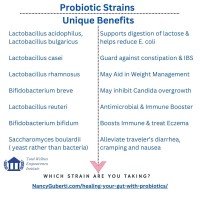
Healing Your Gut with Probiotics: A Comprehensive Guide
Maintaining a healthy gut is crucial for overall well-being. Probiotics, the beneficial bacteria in certain foods and supplements, can be vital in restoring and maintaining gut health. Here are some steps and lifestyle factors to consider for healing your gut with probiotics:
Incorporate Probiotic-Rich Foods
Include a variety of probiotic-rich foods in your diet. Some excellent options are:
Yogurt: Choose unsweetened, live-culture yogurt.
Kefir: A fermented dairy product that’s packed with probiotics.
Sauerkraut: Fermented cabbage that’s rich in beneficial bacteria.
Kimchi: A spicy Korean side dish made from fermented vegetables.
Take Probiotic Supplements
I love high-quality probiotics! It would help if you considered taking a high-quality probiotic supplement; always check with your medical doctor before starting any new supplement. Look for a probiotic that contains multiple strains of bacteria and a high CFU (colony-forming units) count.
Most Researched Probiotic Strains
Probiotics are beneficial microorganisms that play a crucial role in maintaining a healthy gut microbiome. Here are some of the most researched probiotic strains and their benefits:
Lactobacillus acidophilus
Benefits: Produces vitamin K, lactase, and antimicrobial substances. It supports lactose digestion and reduces the colonization of harmful bacteria like E. coli in the digestive tract. It is also effective in combating bacterial vaginosis.
Lactobacillus casei
Benefits: A lactic acid producer that supports the growth of beneficial bacteria, including L. acidophilus, and helps guard against constipation and irritable bowel.
Lactobacillus rhamnosus
Benefits: Balances the GI microflora and thrives in acidic stomach conditions—one of the most widely studied probiotic strains.
Bifidobacterium breve
Benefits: Inhibits E. coli and Candida albicans, a common cause of female yeast infections. Ferments sugars to produce lactic acid and acetic acid.
Lactobacillus bulgaricus
Benefits: It metabolizes sugars to produce lactic acid, reduces intestinal pH, and inhibits the growth of pathogens. It helps lactose-intolerant individuals digest dairy products.
Lactobacillus reuteri
Benefits: It is found in the GI tract, urinary tract, skin, and breast milk. It enhances mucosal barrier function, supports respiratory function, relieves digestive discomfort, and promotes vaginal microbiota.
Bifidobacterium bifidum
Benefits: It is commonly found in the colonic microbiome and healthy vaginas. It supports digestive health and maintains a balanced gut microbiome.
Saccharomyces boulardii
Benefits: A probiotic yeast is known for defending against and alleviating various forms of diarrhea. It inhibits pathogenic bacteria responsible for traveler’s diarrhea and produces compounds with anti-toxin effects.
Probiotic Combinations
Probiotic strains are often combined in multi-strain supplements to provide complementary benefits, support various bodily functions, and enhance overall health.
The Growing Use of Probiotics
With increasing research on the gut microbiome, probiotic supplementation has become more popular. Nearly 4 million Americans take probiotics to support their gut health. However, choosing a high-quality probiotic supplement can take time due to market saturation. Consulting a health practitioner is essential to ensure the right fit based on individual needs, as potencies, strain combinations, and stability vary by brand. A high-grade probiotic can help maintain gut microbiome balance, supporting a range of interconnected health systems.
Better yet, don’t guess, but get tested. Did you know that the Comprehensive Stool Analysis will analyze which strains of bacteria you currently have and which beneficial strains would be best for you? That is as personalized of a test as you can get!
Order your test kit today. The lab mails the kit to you, and you send the specimen back to the lab using the prepaid mailer. Once the results are ready, we will review them.
Eat Prebiotic Foods
Prebiotics are non-digestible fibers that feed probiotics and help them thrive. Include these prebiotic-rich foods in your diet:
Garlic
Onions
Leeks
Asparagus
Bananas
Chicory root
Jerusalem artichokes
Reduce Stress
Chronic stress can negatively impact your gut health, so it’s best to incorporate stress-reducing activities into your daily routine.
Try some of these stress-reducing strategies, such as:
Yoga: Helps reduce stress and improve digestion.
Meditation: Can calm the mind and support a healthy gut-brain connection.
Deep Breathing Exercises: Simple techniques to help manage stress levels.
Exercise Regularly
Physical activity promotes healthy digestion and supports a balanced gut microbiome. Most days of the week, aim for at least 30 minutes of moderate exercise, such as walking, cycling, or swimming.
Stay Hydrated
Proper hydration is essential for digestive health. Drink plenty of water throughout the day to support your digestive system and help maintain a healthy gut lining.
Get Enough Sleep
Poor sleep can disrupt your gut microbiome. Aim for 7-9 hours of quality sleep each night. Establish a regular sleep routine and create a relaxing bedtime environment.
Limit Processed Foods and Sugar
Processed foods and excessive sugar intake can harm your gut bacteria. To promote a healthier gut, focus on eating whole, unprocessed foods and reducing your sugar consumption.
Avoid Overuse of Antibiotics
While antibiotics are sometimes necessary, they can disrupt the balance of your gut microbiome. Use antibiotics only when prescribed by a healthcare professional, and consider taking probiotics afterward to help restore your gut bacteria.
Listen to Your Body
Pay attention to how your body responds to different foods and lifestyle changes. Everyone’s gut is unique, and what works for one person may not work for another. Adjust your diet and habits based on your personal needs and experiences.
Incorporating these probiotic foods, supplements, and lifestyle factors into your daily routine can support and heal your gut, leading to better overall health and well-being.
Tags: Comprehensive Stool Analaysis, Functional Medicine, gut health, mental health, Nancy Guberti, probiotics
Leave A Reply (No comments So Far)
No comments yet